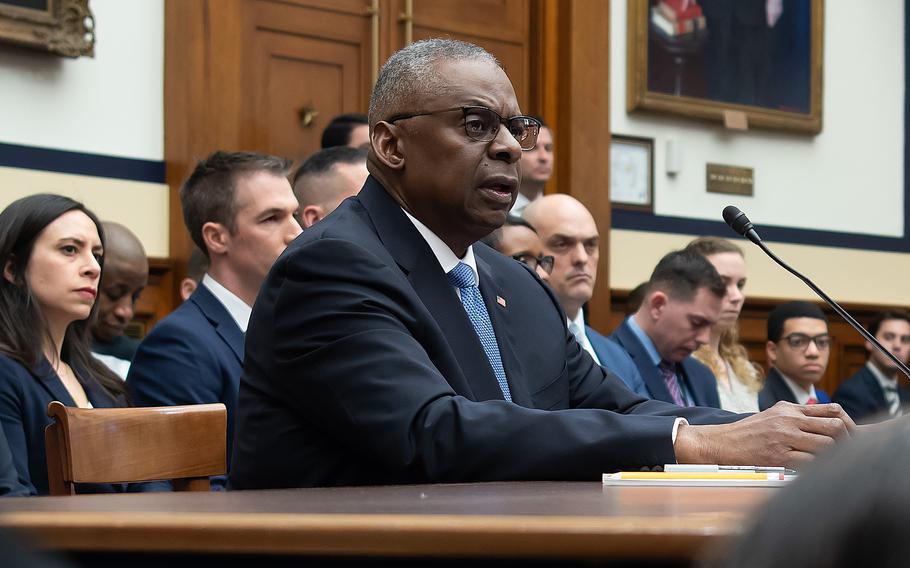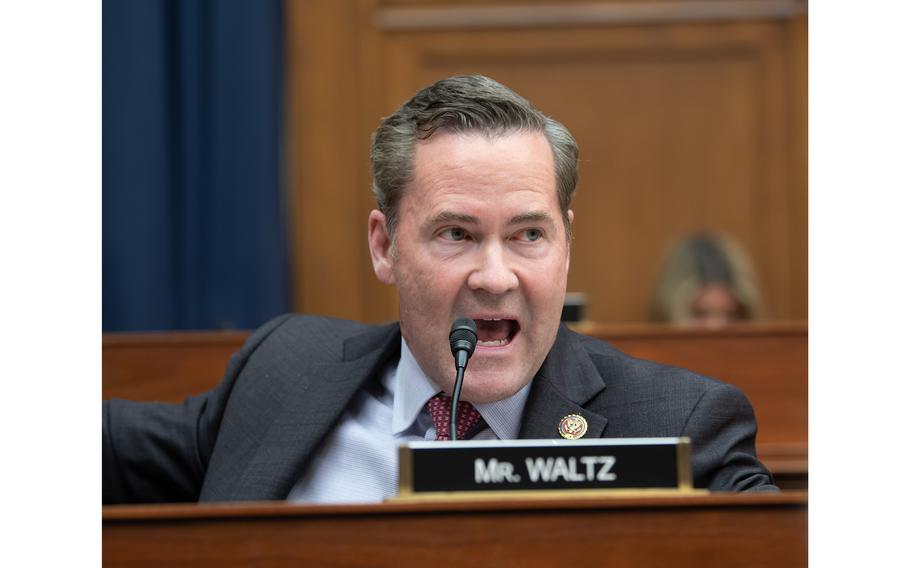
Defense Secretary Lloyd Austin testifies during a House Armed Services Committee hearing in Washington, D.C., on Feb. 29, 2024. (Carlos Bongioanni/Stars and Stripes)
WASHINGTON — Defense Secretary Lloyd Austin on Thursday took responsibility for the secrecy surrounding his hospitalization last month but pushed back against accusations from House Republicans that there were gaps in command authorities during his absence.
Austin said there was never a lapse in command and control during his treatment for complications from prostate cancer surgery while also acknowledging a breakdown in communication to top government leaders.
“I should have promptly informed the president, my team, Congress and the American people about my cancer diagnosis and subsequent treatment,” he said in testimony to the House Armed Services Committee. “We did not handle this right and I did not handle this right.”
Austin said he did not instruct his staff to withhold information about his hospitalization but appeared to blame his underlings for the notification delays.
“I was the patient and so I expect that my organization would do the right thing,” he said.
Austin was called to appear before the House panel after failing to notify the White House, Congress and senior Pentagon officials of his hospitalization at Walter Reed National Military Medical Center in Bethesda, Md., for several days in early January.
His prostate cancer diagnosis in December and the surgery for it later that month were also not disclosed to the White House until last month.
The initial silence about Austin’s hospitalization caused an uproar on Capitol Hill, with several Republicans and at least one Democrat calling for Austin’s resignation.
An unclassified summary of an internal Pentagon review released Monday blamed privacy restrictions and staff hesitancy for the lack of transparency but did not find “any indication of ill intent or an attempt to obfuscate.”
Sen. Jack Reed, D-R.I., the chairman of the Senate Armed Services Committee, said the review’s recommendations to improve communication served as a “starting point for ensuring this lapse never occurs again.”
But Republicans largely dismissed the legitimacy of the review, noting it was conducted by Austin’s subordinates and subject to his approval.

Chairman of the House Armed Services Committee Rep. Mike Rogers, R-Ala., presides over a hearing on Thursday, Feb. 29, 2024, on Capitol Hill in Washington, D.C. (Carlos Bongioanni/Stars and Stripes)
“It includes no explanation of why the president and his staff were left in the dark. It makes no recommendations to improve communication with the White House. And unsurprisingly, it holds nobody accountable,” said Rep. Mike Rogers, R-Ala., the chairman of the House Armed Services Committee.
A separate investigation by the Pentagon’s inspector general to examine the “the roles, processes, procedures, responsibilities and actions” related to Austin’s hospitalization is ongoing.
Austin repeatedly came under fire from Republicans on Thursday who said they wanted to see accountability for the incident. They grilled Austin about why no one has faced disciplinary action.
“Who will be held accountable for this, this embarrassment?” asked Rep. Jim Banks, R-Ind.
Rep. Mike Waltz, R-Fla., said Austin showed poor judgment, drawing a comparison to the swift notification of the public last year after Marine Corps Commandant Gen. Eric Smith was hospitalized for cardiac arrest.

Congressman Mike Waltz, R-Fla., addresses Defense Secretary Lloyd Austin (not seen) during a House Armed Services Committee hearing on Thursday, Feb. 29, 2024, on Capitol Hill in Washington, D.C. (Carlos Bongioanni/Stars and Stripes)
“My teenage daughter knows to tell her supervisor if she’s not going to work. The American people — truck drivers, bartenders — know they have to tell their boss or they get fired,” said Waltz, a former Green Beret. “But you’ve held yourself to a different standard and that’s unacceptable.”
Several Republicans noted a service member would have faced consequences if they had gone to a hospital without notifying their chain of command.
Democrats on the committee bristled at the Republican attacks and attempted to steer the conversation to the failure of the Republican-led House to approve national security legislation and fund the Pentagon.
A supplemental funding package that would provide billions of dollars in aid for Ukraine, Israel and Taiwan has been held up by Republicans for months while Congress has yet to pass a full-year 2024 budget for the Defense Department.
“Mr. Secretary, it is not you who is the problem. It’s not what happened in your health emergency that’s the problem,” said Rep. John Garamendi, D-Calif. “When will this committee actually stand up for the defense of this nation? When will my colleagues on the Republican side of this committee find the courage to get the job done?”
Rep. Elissa Slotkin, D-Mich., said Austin was taking accountability for his actions by simply appearing before the committee and subjecting himself to the intrusive questioning of lawmakers.
“Accountability is having to come and sit in front of people and their outrage and their drama in public about your health issues and the mistakes you’ve admitted you made when the entire world is wondering what the hell is going on with the United States of America,” she said.